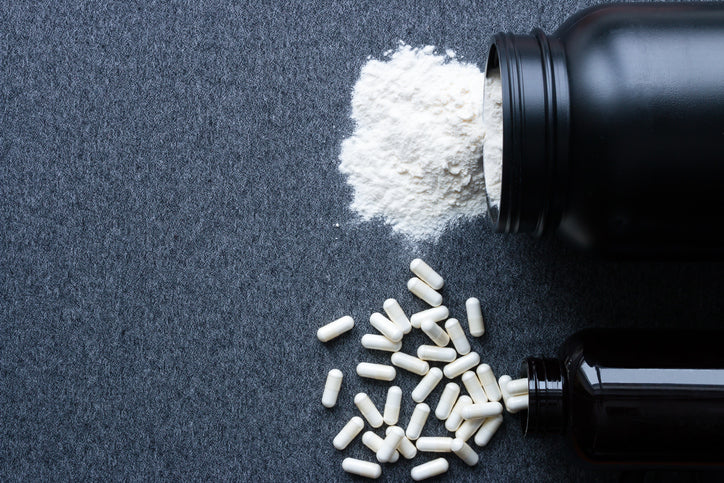
If supplements for exercise performance had a GOAT (greatest of all time), it's creatine. Even those who have never stepped foot in the gym have heard of it. It often comes with some completely unfounded controversy with allegations ranging from everything from kidney failure to steroid-like effects.
Those allegations won't be addressed in any detail in this article, maybe another time. Suffice to say of the all the supplements one could take to enhance their performance in the gym creatine would have to be the safest and most well researched.
In this article, we will take a look at a specific aspect of creatine supplementation, which is whether creatine is required to be cycled. Cycling is still a common recommendation accompanying any creatine sale in supplement stores across Australia. But do you really need to cycle it?
Creatine - A Quick Overview
Before looking at whether cycling creatine is required, let's do a quick refresher on what creatine is, why people take it, and how it works.
Creatine naturally occurs in the body from amino acids in the liver and pancreas. You will find creatine in foods such as meat and fish. If you have had a decent-sized steak, you have taken creatine. When supplemented, it comes in either powder or capsule form.
Primarily, creatine is supplemented for its performance benefits on power output when in the gym, lifting weights and aiding muscle growth. Supplementing creatine may also improve cognitive performance and benefit anaerobic exercise.

How does it work? In terms of its benefits on exercise, creatine works as follows: Creatine converts into creatine phosphate in the body which stores in our muscles. When lifting or performing any high-intensity exercise, our bodies rely on an energy system known as the adenosine triphosphate-creatine phosphate (ATP-CP) system. To cut a long story short, when exercising at high intensity, the ATP-CP runs out of energy quickly. Creatine phosphate stored in the muscles essentially lends phosphates so that power output can be maintained longer.
If the above isn't enough, creatine may also increase lean body mass, which relates to creatines ability to increase intracellular water retention.
Why Do People Think You Need To Cycle Creatine?
When we talk about cycling here, we are not talking about the people in lycra on the road. To clarify, the cycling we are referring to here is the process of taking a supplement for a specified time and then not taking it for a specified time. With creatine, cycling may look something like this:
- 6-8 weeks of taking creatine every day.
- 2-4 weeks with no creatine at all.
- (Repeat)
1) Your body adapts or builds a tolerance to the supplement - whatever it may be - and it no longer has the same effects. The aforementioned is the case with caffeine, for example, and was covered in a previous article here: Should You Be Cycling Caffeine?. Ceasing supplementation for a planned period means that when you do start retaking it again, you experience the full benefits.
2) Our bodies are good at regulating things. If you take a substance that our body produces naturally, it can sense the increase and therefore turn off natural production. If prolonged supplementation can impair natural production, having planned time off the substance allows our bodies natural production to return to normal.
A case could be made for the need to cycle creatine if it either:
a) stops being as effective after prolonged supplementation because your body builds a tolerance, or b) prolonged supplementation impairs natural production.
So do one of these occur when you supplement creatine?
Addressing Cycling

Addressing the first point, does our body build a tolerance to creatine supplementation over time and therefore do the effects diminish? Creatine does not act on any receptors, and therefore, there is no mechanism for becoming de-sensitised to it. As mentioned previously, creatine works by saturating the muscle, and as long as the muscle is 100% saturated, then creatine will continue producing the same benefits week in, week out. So the answer is no, our bodies do not get used to creatine and building a tolerance to creatine is not a thing. So there is no case to be made for cycling creatine here.
Let us look at the second justification for cycling creatine, being that taking creatine impairs our natural production. Taking creatine indeed reduces our natural production. However, this only becomes a problem if our natural production becomes permanently damaged, meaning that once you stop taking creatine, natural production does not return to normal. Studies show that once long term supplementation of creatine ceases, natural production returns to normal. There is no case to be made for cycling creatine here either.
The Verdict
While the case to cycle creatine might seem logical on the surface, when looking at the evidence, it doesn't hold up. Cycling creatine is still a pretty common recommendation, given in many supplement stores across the country. Honestly, if you want to follow this cycle creatine, there is absolutely no harm in doing so. However, remember that if you're going to keep taking it and continue to reap the benefits of this well researched and widely used supplement year-round, you can. There is no need to cycle creatine.
-Gym Meals
